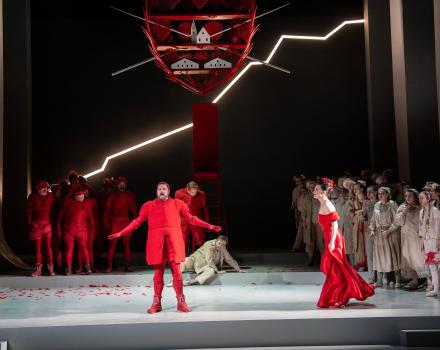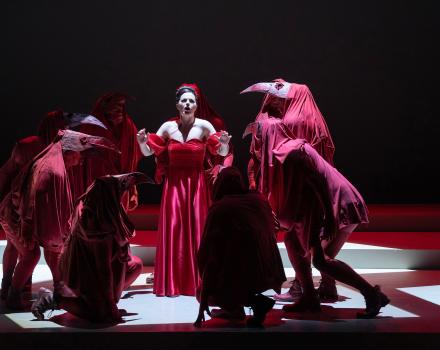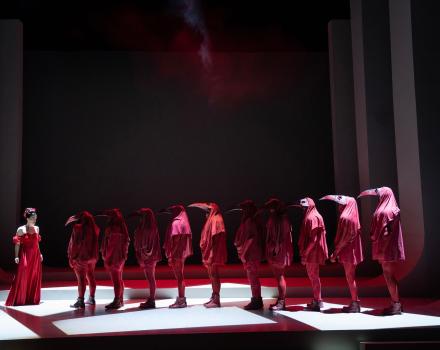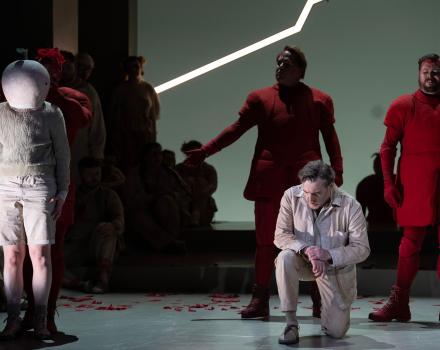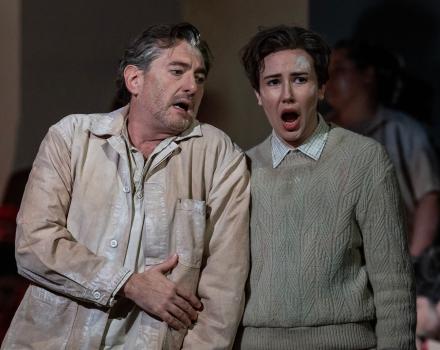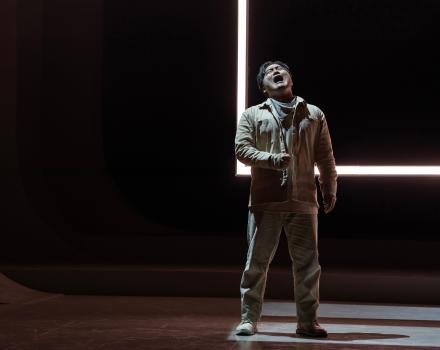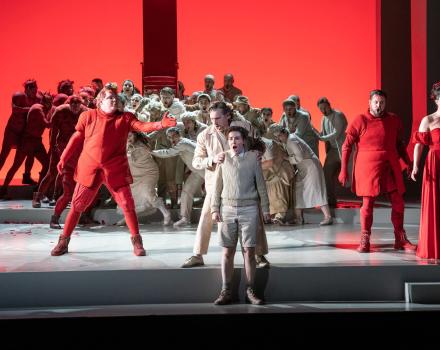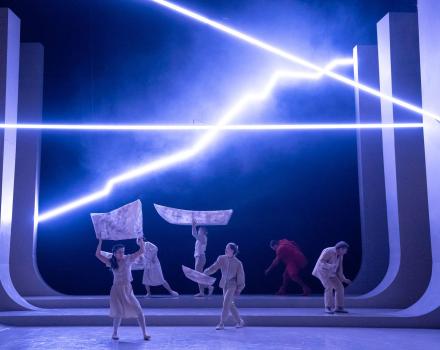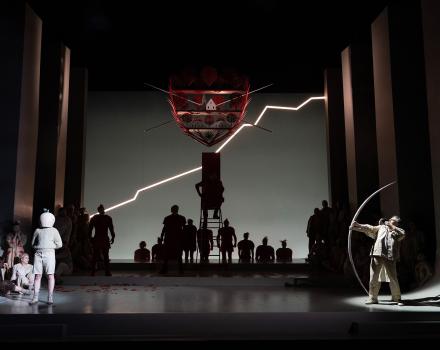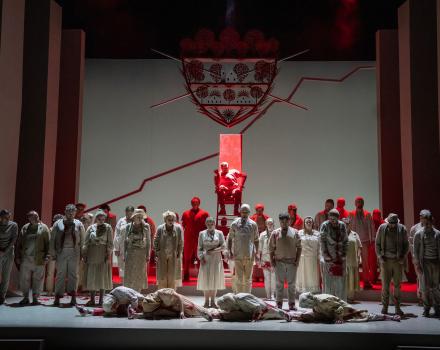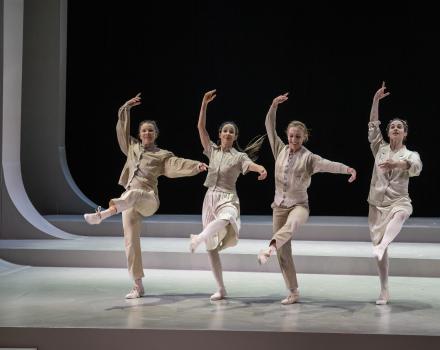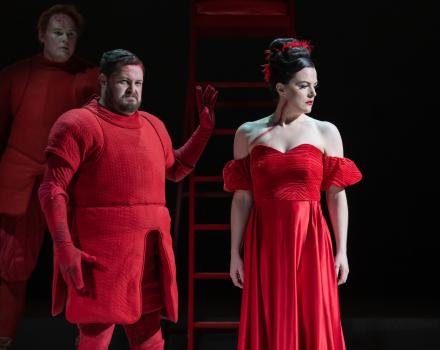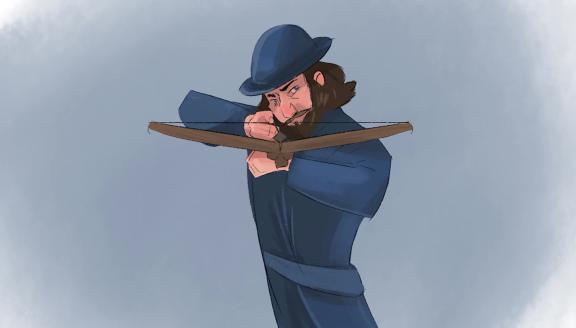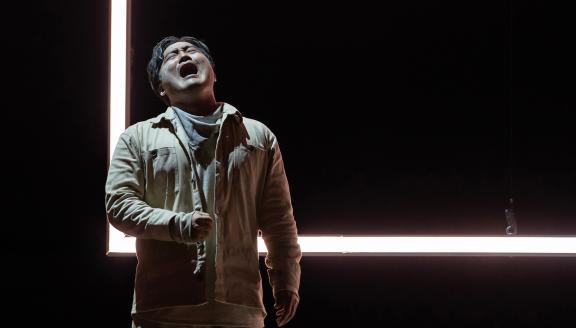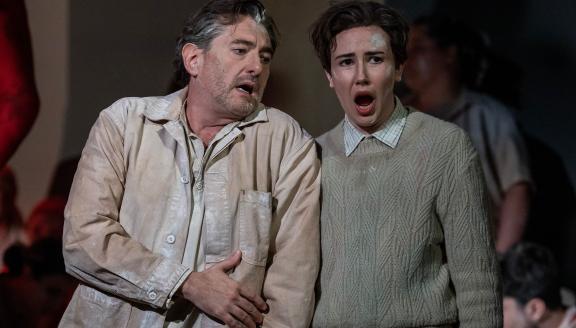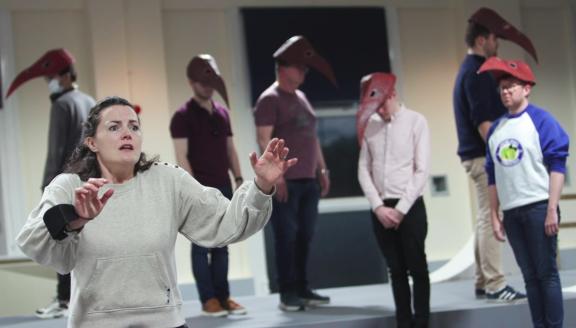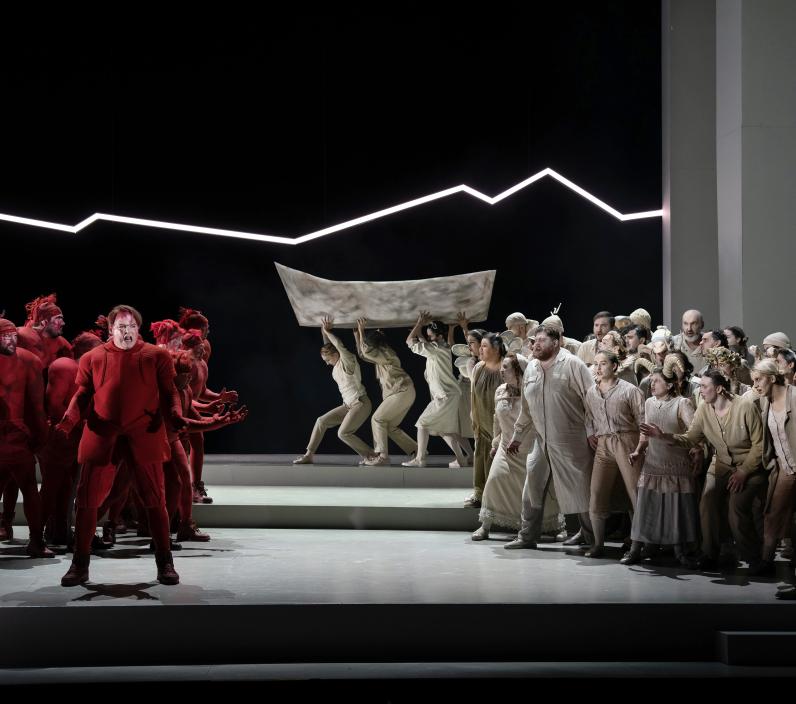
A freedom fighter in Austrian-occupied Switzerland. An oppressive Habsburg governor. The most famous Swiss apple. And a love story that crosses national divides.
Rossini’s thrilling epic, his final masterpiece with the world’s most famous overture, is his most ambitious, forward-looking and vocally challenging opera. Having become the rallying cry of the 1830 revolution in France, Rossini’s final opera is nothing short of revolutionary itself. Retelling the legend of the Swiss folk hero based on Schiller’s play, William Tell is a grandiose ode to freedom. Staged for the first time in Ireland since 1875, this production is conducted by Fergus Sheil and directed by Julien Chavaz who takes a mythological approach. For him, ‘the story is not just about a remote Swiss community facing Austrian invaders. It is the story of a society that suddenly has to face a threat to its model of civilisation.’
Cast
|
Guillaume Tell
|
Brett Polegato
|
|---|---|
|
Arnold Melchtal
|
Konu Kim
|
|
Mathilde
|
Máire Flavin
|
|
Jemmy
|
Amy Ní Fhearraigh
|
|
Hedwige
|
Imelda Drumm
|
|
Melcthal Senior / Walter Furst
|
Lukas Jakobski
|
|
Gessler
|
David Ireland
|
|
Leuthold
|
Gyula Nagy
|
|
Ruodi
|
Andrew Gavin
|
|
Rodolphe
|
Patrick Hyland
|
|
Hunter
|
Matthew Mannion
|
|
Dancers
|
Stephanie Dufresne
Sophia Preidel
Laura Garcìa Aguilera
Jeanne Gumy
|
|
Chorus
|
Irish National Opera Chorus
|
|
Orchestra
|
Irish National Opera Orchestra
|
| ... | |
|
Music
|
Gioachino Rossini
|
|---|---|
|
Text
|
Étienne de Jouy
Hippolyte Bis
after Friedrich Schiller's play
|
|
Conductor
|
Fergus Sheil
|
|
Director
|
Julien Chavaz
|
|
Sets
|
Jamie Vartan
|
|
Associate Sets
|
Lou Dunne
|
|
Costumes
|
Severine Besson
|
|
Lighting
|
Sinéad Wallace
|
|
Choreographer
|
Nicole Morel
|
|
Chorus Director
|
Elaine Kelly
|
|
Assistant Directors
|
Chris Kelly
Alixe Durand-Saint-Guillain
|
|
Répétiteurs
|
Aoife O’Sullivan
Yvonne Collier
|
| ... | |
Co-production with NOF - Nouvel Opéra Fribourg - Neue Oper Freiburg.
Videos
Story
Act I
William Tell laments the oppression of the Swiss by the Habsburgs in the company of his wife Hedwige and his son Jemmy. Their village is preparing three weddings to be officiated by old Melcthal. His son Arnold, a friend of William Tell, is in love with the Habsburg princess Mathilde, which is irreconcilable with his people’s aspirations for freedom.
While the weddings are in full swing, the imperial bailiff and Austrian leader Gesler’s hunting procession can be heard. The shepherd Leuthold hurries ahead, having killed an Austrian soldier who wanted to kidnap his daughter. Tell whisks Leuthold to safety across Lake Lucerne. Arnold has secretly left for his beloved. Rodolphe, leader of Gesler's soldiers, searches the village for Leuthold. Since no one tells him who helped Leuthold to escape, Rodolphe sets the village on fire and arrests old Melcthal.
Act II
Hunters and herdsmen praise the joys of the Swiss mountains and nature. Mathilde has left the hunt to meet Arnold, they confess their love for each other. As soon as Arnold attains military dignity, he may ask for Mathilde's hand. She withdraws when Tell and the resistance fighter Walter Furst approach. The men inform Arnold that his father, old Melcthal, was killed by the Austrians. They mistrust him because he loves the princess. Arnold is deeply moved and declares his loyalty to the conspirators. Representatives of all Swiss cantons appear, declare Tell their leader and swear the Rütlischwur, which seals their intrepid fight for their freedom.
Act III
At a castle ruin, Arnold warns Mathilde that despite his feelings for her, he will avenge his father and remain loyal to his country, and refuses to flee with her. They separate in the knowledge that it is a farewell forever.
In the village of Altdorf, Gesler stages a celebration of Habsburg sovereignty and orders that all Swiss people should kneel before a statue with his hat on. When Tell and Jemmy refuse, Gesler forces Tell to shoot an apple from his son's head. Tell succeeds in the shot, but when another arrow slips out of his sleeve, he must confess that he would have used it to kill Gesler if he had missed his first target. He is sentenced to death and taken away. Mathilde takes Jemmy with her.
Act IV
Arnold laments Tell's arrest in his hut and calls on his comrades for armed insurrection.
Hedwige is desperate and wants to join her family to die with them when Mathilde brings the unharmed Jemmy to her. Jemmy sets the hut on fire, which is the agreed sign of the Swiss to fight.
Tell is to be rowed across Lake Lucerne by Gesler and his men for his sentence to be carried out. When fog and a storm come up, Tell's shackles are loosened, because he alone can navigate the boat safely. Shortly before docking, Tell jumps ashore onto a rock and abandons the boat. His wife and son hurry to him and give him his crossbow. Tell sees the burning hut and shoots Gesler, who managed to save himself. Walter and his people appear and rejoice at the oppressor’s death. Arnold and his men also appear and announce the liberation of Altdorf. The Swiss celebrate Tell as their liberator and sing of a new age of peace and freedom.
INSIGHTS
Director’s note, by Julien Chavaz
Rossini’s William Tell offers us a binary view of the world, one of simple village people and of evil invaders. On the one hand we have Tell’s serene mountain community, isolated from the world and in constant communion with nature. On the other, we have Gessler and his soldiers, wicked oppressors with no redeeming qualities, who invade the Swiss homeland, threatening their families and their simplicity. Such black and white scenarios are the stuff of fairy tales. Our production is, therefore, set in a dream-like world, operating with its own rules and populated with wide-eyed and innocent characters.
The natural world runs through the veins of this piece, from the majestic Swiss Alps which drive bands of farmers into battle, to the shadowy secluded forests which inspire both love and terror in whoever passes through them. Nature is in the hearts and minds of the Swiss community, mirroring people’s passions, fears and their acts of courage. They are so at one that I have created a world in which the Swiss people take on the very forms of nature.
Rossini captures the passions of the human soul like no one else. In William Tell, he explores what drives us to fight and resist – the Swiss people must fight for their freedom so that they can continue to laugh and to sing. There are a million notes in this score, and they all seem to resonate perfectly so as to make the performers dance on stage. Rossini must also be admired for his wit, his irony and his unique sense of self-mockery. He creates wonderful moments where, despite the violence and high stakes, he allows the characters to step aside and comment on the scenes that have just been presented, as if to remind us that he who can laugh at himself is invincible.
In the midst of this tempestuous and frenetic world, there is a voice of youth, the voice of Jemmy. On a stage dominated by pugnacious men, it is a voice that seems magical, because it is embodied by a soprano. In this testosterone-fuelled atmosphere, the voice of the child is a strong poetic act. The metaphor of the apple is that of the child’s innocence and trust in his father. While William Tell carries the fate of his family and his country on his shoulders, his son in his innocence defies the oppressors with nothing but his love and trust. It is through the eyes of his son that William Tell becomes a human figure.
The storm eventually subsides but the inner fire continues to boil. It is an unforgettable, life-changing musical journey.
Gallery
